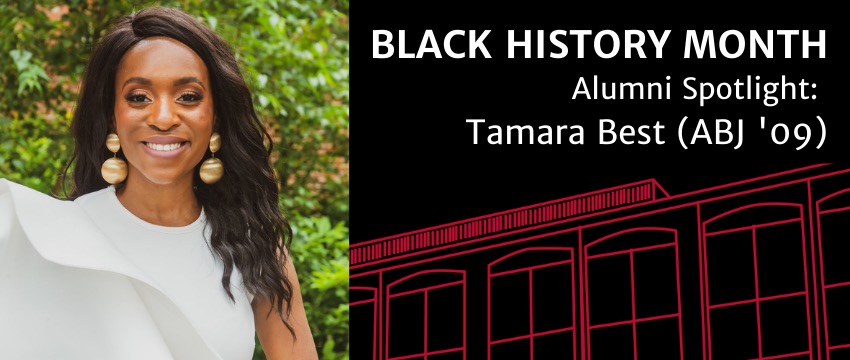Black History Month Alumni Spotlight: Tamara Best (ABJ ’09)

Black History Month Alumni Spotlight: Tamara Best (ABJ ’09)
Editor’s Note: This is one in a series of spotlights highlighting the work of some of our alumni in celebration of Black History Month. Please watch for more profiles in the weeks to come.
Tamara Best works as a culture writer, editor and creative. She was recently named as a 2021 Nieman visiting fellow at Harvard University’s Nieman Foundation for Journalism. Best will conduct research on centralized social media hubs that can be used to create outlets for civic engagement among underrepresented communities.
What does Black History Month mean to you?
Black History Month is both an opportunity to pause for deeper reflection and also an extension of what it means to live with a sense of purpose. It’s a mindfulness of history, both the individual and communal senses that have shaped my lived reality. In concert they are also a reminder of the obligations I have to plant seeds of progress for the future. So often narratives and discussions around Black history are centered on liberation movements. It goes without saying those are important, particularly given the omissions within the educational system. But equally as important are explorations — historical and present day — of Black excellence, joy and the cultivation and preservation of community.
What clubs and activities did you participate in at UGA and Grady that were instrumental to your success as a career professional?

Being a Grady Ambassador and a member of the National Association of Black Journalists have been instrumental in my success thus far as a professional.
The ambassador program really provides students with the unique opportunity to engage with the college on a deeper level, both in the participatory sense of events but also in serving as a front-facing leader on behalf of Grady. That experience helped me understand the intersections between broader organizational strategy and priorities and how those things are manifested in a leadership role.
Of all my experiences, NABJ played a singular role in my post-Grady career. From the collaborative work done within the organization and across UGA, it really provided a chance to create meaningful work. Perhaps more important than that, it was a second family for me at UGA. It was one of the first instances where I saw real value and the necessity of cultivating a professional home in an industry where few people looked like me. Over the last decade, it has been the second homes I have cultivated that have nourished and sustained me in the midst of success, disappointment and difficult news days.
What does the recent movement to continue the fight for racial justice mean to you personally and professionally?
Well, I would say the fight isn’t recent but rather a different iteration in an ongoing fight that has been happening in this country since 1619. However, the last year has been a reminder that the professional is personal and the personal is professional. As a Black woman in America there is no leaving my identity at the door in whatever space I enter. I have been reminded, professionally in particular, of how well-intentioned and yet misguided people can be in their desire to be allies. And in those moments, and on weeks when the news is particularly difficult, I am reminded that I can choose me without explanation. That I can, and have to for my well-being, unplug from the cacophony of social media, headlines and the education of others. Instead, I can retreat to the safety of my loved ones or the spaces that nourish my spirit. We all have a part to play in a more just and equal society, and I’m reminded that how and when I choose to engage personally and professionally is for me to determine. Like a sea, it ebbs and flows and has different iterations; all are needed and all are valuable.
What skills, values or circumstances do you attribute to your success?
Flexibility has been a critical skill that has attributed to my success thus far. When I graduated, the country was in the depths of a recession and jobs were scant. While I had ideas and ideals about what I wanted to do, I had a list of skills I wanted to learn. At every juncture and opportunity I would start with the end in mind. “When I move onto the next role, what skills will I want to take with me, that will serve me well regardless of what I end up doing?” Having that POV has enabled me to be nimble and take chances in ways that I am not sure I would have otherwise.
For me, I have been always very clear around the values of why I became a journalist. It is different for everyone but I think having a clear sense of your core why allows you to navigate your career with a clear sense of purpose and integrity. As a result you evaluate opportunities and challenges not just in terms of how they serve you and your goals but how they fulfill the sense of higher calling on your career. The singular circumstance that has defined my career was an internship at The New York Times. That opportunity led to full-time employment there shortly after graduation and with it a whole host of opportunities that have shaped my life personally and professionally. It was my first real professional home and for that I will always be grateful.